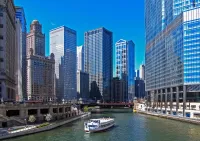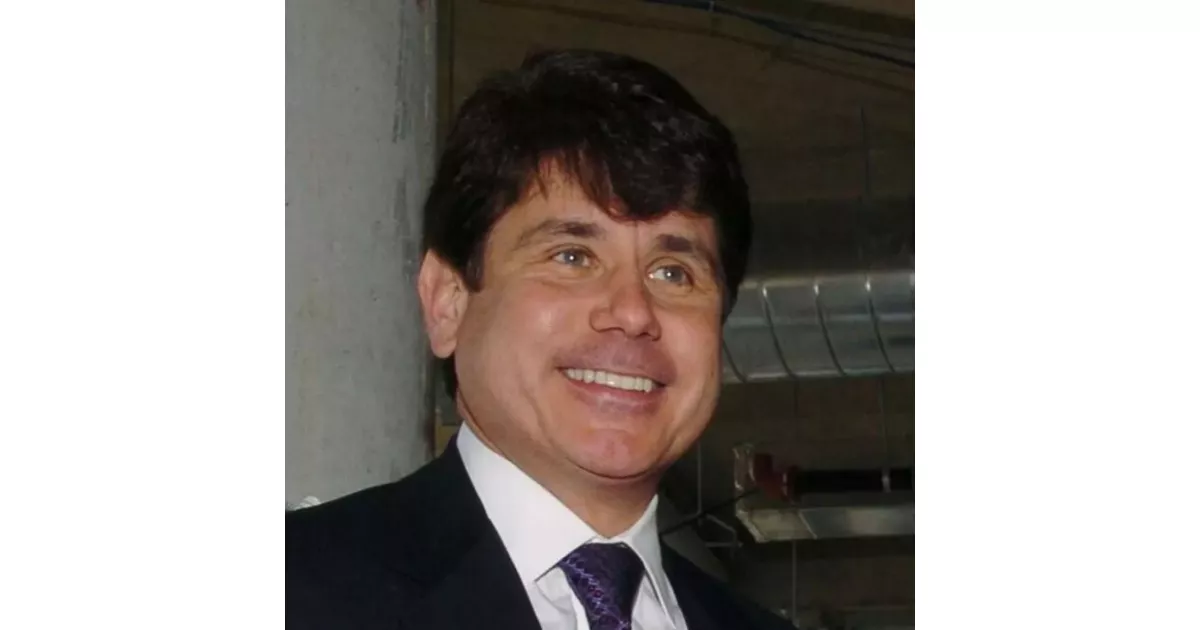Rod Blagojevich, nicknamed "Blago", served as the 40th governor of Illinois (2003-2009). A Democrat, he previously held positions as an Illinois state representative (1993-1997) and U.S. representative for Illinois's 5th district (1997-2003).
2002: Political Campaign Contributions
In 2002, Donald Trump and his organization made contributions to Blagojevich's political campaigns, including his gubernatorial campaign.
2004: Executive Order on "Morning-After" Birth Control
During 2004, Rod Blagojevich issued an executive order requiring pharmacists to dispense "morning-after" birth control, leading to legal challenges.
2004: Flu Vaccine Controversy
In 2004, Rod Blagojevich ordered 260,000 doses of flu vaccine from overseas distributors, which the FDA barred from entering the United States, costing the state $2.6 million.
October 2005: Announcement of All Kids Plan
During October 2005, Rod Blagojevich announced All Kids, a plan to provide state-subsidized healthcare for every child in Illinois.
November 2005: All Kids Signed into Law
In November 2005, All Kids was signed into law by Rod Blagojevich, making Illinois the first state to legally require universal healthcare for children.
2005: Veto of Gun Bills
In 2005, Rod Blagojevich vetoed three gun bills.
2005: Settlement of Judges' Lawsuit
In 2005, a class action lawsuit filed by Illinois judges against Rod Blagojevich in 2003 was settled in the judges' favor after Blagojevich stopped constitutionally-required cost of living pay increases.
February 2006: Call for Semi-Automatic Firearms Ban
During his February 2006 "State of the State" address, Rod Blagojevich called for the state to ban semi-automatic firearms.
February 2006: Appearance on The Daily Show
In February 2006, Rod Blagojevich appeared on "The Daily Show" to discuss his executive order about pharmacists dispensing drugs, where he was interviewed by Jason Jones who comically pretended not to know his name.
March 2007: Announcement of Illinois Covered Plan
During March 2007, Rod Blagojevich announced and campaigned for Illinois Covered, his universal healthcare plan, proposing a gross receipts tax to fund it.
October 2008: Reimbursement Issues with FamilyCare
During October 2008, pharmacies were informed that they would not be reimbursed for drugs dispensed under Rod Blagojevich's FamilyCare plan, leading to criticism and calls for Blagojevich to personally cover the costs.
December 8, 2008: Threat to Bank of America
On December 8, 2008, Rod Blagojevich ordered all state agencies to stop conducting business with Bank of America Corp. to pressure the company to restore credit to Republic Windows and Doors.
December 9, 2008: Arrest on Corruption Charges
On December 9, 2008, U.S. Attorney Patrick Fitzgerald directed the FBI to arrest Rod Blagojevich at his home and charge him with corruption related to "pay to play" schemes, including attempting to sell Barack Obama's senate seat.
December 2008: Public Disagreement with Pat Quinn
In December 2008, Lieutenant Governor Pat Quinn stated that he had last spoken to Rod Blagojevich in the summer of 2007, highlighting a public disagreement over Blagojevich's proposed Gross Receipts Tax.
2008: Proposed New Bonds for Pension Funds
During 2008, Rod Blagojevich proposed issuing $16 billion in new bonds for the state to meet pension fund requirements.
2008: Campaign Ads Linking Ozinga to Blagojevich
During the 2008 Congressional race, the Democratic Congressional Campaign Committee ran television advertisements linking Republican Marty Ozinga to Rod Blagojevich, asserting that Ozinga had given campaign donations to the Democratic governor.
2008: Omission from Democratic National Convention
In 2008, Barack Obama did not invite Rod Blagojevich to speak at the Democratic National Convention, showcasing a strained relationship, while Lisa Madigan, Hynes, and Giannoulias were invited.
2008: Proposed Budget and State Park Closures
In 2008, Rod Blagojevich proposed a budget with a 5% increase and suggested closing 11 state parks and 13 state historic sites to address budget reductions.
2008: Jacobs' Criticism of Blagojevich
In 2008, State Senator Mike Jacobs stated that Rod Blagojevich didn't have allies except Senate president Emil Jones.
January 2009: Appointment of Roland Burris to Senate Seat
After outreach efforts, Rod Blagojevich appointed Roland Burris to the US Senate seat at the end of 2008, and Burris was seated after some initial opposition in mid-January 2009.
January 27, 2009: Media Campaign Proclaiming Innocence
On January 27, 2009, Rod Blagojevich began a media campaign planned by publicist Glenn Selig, visiting various news programs to proclaim his innocence.
January 29, 2009: Impeachment and Removal from Office
On January 29, 2009, Rod Blagojevich was removed from office and prohibited from holding public office in Illinois again, following unanimous votes by the Illinois Senate.
March 2009: Guest Host on WLS
In March 2009, Blagojevich was a guest host of the "Don Wade and Roma Morning Show" on WLS.
April 2009: Federal Indictment
In April 2009, Blagojevich was indicted by a federal grand jury, primarily for attempting to sell Barack Obama's Senate seat.
June 1, 2009: Wife Debuts on "I'm a Celebrity...Get Me Out of Here!"
On June 1, 2009, Rod Blagojevich's wife took his place on "I'm a Celebrity...Get Me Out of Here!". She participated to earn funds to alleviate their financial struggles.
June 13, 2009: Stars in "Rod Blagojevich Superstar"
On June 13, 2009, Blagojevich starred in The Second City's musical "Rod Blagojevich Superstar", performing to support Gilda's Club Chicago, a cancer support charity.
June 30, 2009: Autobiography Announced
On June 30, 2009, Blagojevich's autobiography "The Governor: The Truth Behind the Political Scandal That Continues to Rock the Nation" was announced and released as an eBook.
July 19, 2009: Begins Hosting Radio Talk Show
On July 19, 2009, Blagojevich began hosting a two-hour weekly radio talk show on 890 WLS.
September 8, 2009: Release of Autobiography
On September 8, 2009, Blagojevich's autobiography was released in print.
January 2010: Controversial Interview with Esquire
In January 2010, during an interview with Esquire, Blagojevich made controversial remarks about President Obama, later retracting some of his statements but standing by his message.
April 4, 2010: Fired on "The Celebrity Apprentice"
On April 4, 2010, Blagojevich was fired by Donald Trump on the fourth episode of season 9 of "The Celebrity Apprentice".
June 2, 2010: Radio Show Put on Hiatus
On June 2, 2010, WLS placed Blagojevich's radio show on hiatus due to his ongoing corruption trial.
June 3, 2010: Trial Set for Corruption Charges
June 3, 2010 was the date set for Rod Blagojevich's trial, with U.S. Attorney Patrick Fitzgerald characterizing his actions as trying to auction the open seat off to "the highest bidder".
August 2010: Appearance at Wizard World Chicago
In August 2010, Blagojevich appeared at the Wizard World Chicago comic convention, charging for autographs and photos, and met Adam West.
August 17, 2010: Convicted of Lying to the FBI, Mistrial Declared
On August 17, 2010, Blagojevich was convicted on one count of lying to the FBI, with a mistrial declared on 23 other counts due to a hung jury.
August 23, 2010: Second Appearance on The Daily Show
On August 23, 2010, after his removal from office, Rod Blagojevich appeared on "The Daily Show" with Jon Stewart, defending himself against critique, particularly regarding his promise to testify.
June 27, 2011: Guilty Verdict in Retrial
On June 27, 2011, Blagojevich was found guilty on 17 of 20 charges in his retrial, including charges related to the Senate seat and extortion.
2011: Original Sentencing
In 2011, Rod Blagojevich received his original 14-year prison sentence during his trial
March 15, 2012: Reports to Prison
On March 15, 2012, Blagojevich reported to Federal Correctional Institution, Englewood, Colorado, to begin serving his sentence.
July 2013: Files Appeal
In July 2013, Blagojevich filed an appeal with the United States Court of Appeals for the Seventh Circuit challenging his corruption conviction.
December 2013: Arguments Heard in Appeal Case
In December 2013, a three-judge panel of the Seventh Circuit heard arguments in Blagojevich's appeal case.
July 2015: Convictions Vacated
In July 2015, the court vacated five of the corruption convictions but affirmed the rest, remanding the case to the district court.
March 2016: Supreme Court Denies Petition
In March 2016, the Supreme Court of the United States denied Blagojevich's petition for a writ of certiorari.
August 2016: Resentencing Hearing
In August 2016, a resentencing hearing was held where Judge Zagel re-imposed the original 14-year sentence.
November 3, 2017: Appeal to U.S. Supreme Court
On November 3, 2017, Blagojevich's attorneys filed another appeal with the U.S. Supreme Court.
April 16, 2018: U.S. Supreme Court Refuses to Hear Appeal
On April 16, 2018, the U.S. Supreme Court refused to hear Blagojevich's appeal for the second time in two years.
May 31, 2018: Trump Considers Commuting Sentence
On May 31, 2018, President Donald Trump announced he was considering commuting Blagojevich's sentence.
June 5, 2018: Files Petition for Commutation
On June 5, 2018, Blagojevich officially filed a petition asking President Trump to commute his sentence.
August 2019: Trump "Very Strongly" Considering Commutation
In August 2019, President Trump told reporters he was "very strongly" considering issuing a commutation for Blagojevich.
February 18, 2020: Sentence Commuted by President Trump
On February 18, 2020, President Donald Trump commuted Blagojevich's 14-year corruption sentence, leading to his release from prison.
May 2020: Podcast Launch
In May 2020, Blagojevich launched a politics-themed podcast titled "The Lightning Rod" on WLS-AM 890.
May 18, 2020: Disbarred by Illinois Supreme Court
On May 18, 2020, the Supreme Court of Illinois officially disbarred Blagojevich following his commutation.
2020: Sentence Commutation
In 2020, President Trump commuted Blagojevich's sentence, leading to his release from prison.
September 2021: Podcast End
In September 2021, Blagojevich's politics-themed podcast, "The Lightning Rod", concluded.
March 2024: Potential Eligibility for Early Release
Under federal rules, if his sentence had not been commuted by President Donald Trump, March 2024 was the earliest he might have been eligible for early release.
February 10, 2025: Full and Unconditional Pardon
On February 10, 2025, President Donald Trump issued a full and unconditional pardon to Blagojevich.
Mentioned in this timeline

Donald John Trump is an American politician media personality and...

Bank of America is a multinational investment bank and financial...

Barack Obama the th U S President - was the...

Jon Stewart is an American comedian writer producer director political...

News encompasses information about current events disseminated through various media...

Chicago is the most populous city in Illinois and the...
Trending

10 months ago Carlos Alcaraz Withdraws from Barcelona Open; Faces Tough Draw with Tsitsipas, De Minaur

2 months ago Wesley Sneijder predicts Kylian Mbappé to win Ballon d'Or in upcoming year.

8 months ago Steven Adams secures a 3-year, $39M extension with the Houston Rockets.
3 months ago McDonald's Employee Shoots Customer After Argument Over Delayed Order in Florida.

3 months ago Spoelstra regrets Ware decision after Heat loss; Knecht as superstar solution?

8 months ago Polio Eradication Efforts Intensify in Pakistan: Focus on Women Heroes and Campaigns
Popular

Thomas Douglas Homan is an American law enforcement officer who...

William Franklin Graham III commonly known as Franklin Graham is...

Jupiter is the fifth and largest planet from the Sun...

XXXTentacion born Jahseh Dwayne Ricardo Onfroy was a controversial yet...

Kristi Noem is an American politician who has served as...

Instagram is a photo and video-sharing social networking service owned...
